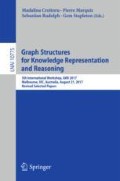Abstract
Standard approaches for inference in probabilistic formalisms with first-order constructs include lifted variable elimination (LVE) for single queries. To handle multiple queries efficiently, the lifted junction tree algorithm (LJT) uses a first-order cluster representation of a knowledge base and LVE in its computations. We extend LJT with a full formal specification of its algorithm steps incorporating (i) the lifting tool of counting and (ii) answering of conjunctive queries. Given multiple queries, e.g., in machine learning applications, our approach enables us to compute answers faster than the current LJT and existing approaches tailored for single queries.
Access this chapter
Tax calculation will be finalised at checkout
Purchases are for personal use only
References
Ahmadi, B., Kersting, K., Mladenov, M., Natarajan, S.: Exploiting symmetries for scaling loopy belief propagation and relational training. Mach. Learn. 92(1), 91–132 (2013)
Bellodi, E., Lamma, E., Riguzzi, F., Costa, V.S., Zese, R.: Lifted variable elimination for probabilistic logic programming. Theory Pract. Log. Program. 14(4–5), 681–695 (2014)
Braun, T., Möller, R.: Lifted junction tree algorithm. In: Friedrich, G., Helmert, M., Wotawa, F. (eds.) KI 2016. LNCS (LNAI), vol. 9904, pp. 30–42. Springer, Cham (2016). https://doi.org/10.1007/978-3-319-46073-4_3
Braun, T., Möller, R.: Preventing groundings and handling evidence in the lifted junction tree algorithm. In: Kern-Isberner, G., Fürnkranz, J., Thimm, M. (eds.) KI 2017. LNCS (LNAI), vol. 10505, pp. 85–98. Springer, Cham (2017). https://doi.org/10.1007/978-3-319-67190-1_7
van den Broeck, G.: Lifted inference and learning in statistical relational models. Ph.D. thesis, KU Leuven (2013)
van den Broeck, G., Niepert, M.: Lifted probabilistic inference for asymmetric graphical models. In: AAAI 2015 Proceedings of the 29th Conference on Artificial Intelligence, pp. 3599–3605 (2015)
Chavira, M., Darwiche, A.: Compiling Bayesian networks using variable elimination. In: IJCAI 2007 Proceedings of the 20th International Joint Conference on Artificial Intelligence, pp. 2443–2449 (2007)
Choi, J., Amir, E., Hill, D.J.: Lifted inference for relational continuous models. In: UAI 2010 Proceedings of the 26th Conference on Uncertainty in Artificial Intelligence, pp. 13–18 (2010)
Darwiche, A.: Recursive conditioning. Artif. Intell. 2(1–2), 4–51 (2001)
Darwiche, A.: Modeling and Reasoning with Bayesian Networks. Cambridge University Press, Cambridge (2009)
Das, M., Wu, Y., Khot, T., Kersting, K., Natarajan, S.: Scaling lifted probabilistic inference and learning via graph databases. In: Proceedings of the SIAM International Conference on Data Mining, pp. 738–746 (2016)
Gogate, V., Domingos, P.: Exploiting logical structure in lifted probabilistic inference. In: Working Note of the Workshop on Statistical Relational Artificial Intelligence at the 24th Conference on Artificial Intelligence, pp. 19–25 (2010)
Gogate, V., Domingos, P.: Probabilistic theorem proving. In: UAI 2011 Proceedings of the 27th Conference on Uncertainty in Artificial Intelligence, pp. 256–265 (2011)
Jensen, F.V., Lauritzen, S.L., Olesen, K.G.: Bayesian updating in recursive graphical models by local computations. Comput. Stat. Q. 4, 269–282 (1990)
Kersting, K., Ahmadi, B., Natarajan, S.: Counting belief propagation. In: UAI 2009 Proceedings of the 25th Conference on Uncertainty in Artificial Intelligence, pp. 277–284 (2009)
Koller, D., Friedman, N.: Probabilistic Graphical Models: Principles and Techniques. The MIT Press, Cambridge (2009)
Lauritzen, S.L., Spiegelhalter, D.J.: Local computations with probabilities on graphical structures and their application to expert systems. J. Royal Stat. Soc. Ser. B Methodol. 50, 157–224 (1988)
Milch, B., Zettelmeyer, L.S., Kersting, K., Haimes, M., Kaelbling, L.P.: Lifted probabilistic inference with counting formulas. In: AAAI 2008 Proceedings of the 23rd Conference on Artificial Intelligence, pp. 1062–1068 (2008)
Poole, D., Zhang, N.L.: Exploiting contextual independence in probabilistic inference. J. Artif. Intell. 18, 263–313 (2003)
de Salvo Braz, R., Amir, E., Roth, D.: Lifted first-order probabilistic inference. In: IJCAI 2005 Proceedings of the 19th International Joint Conference on Artificial Intelligence (2005)
Shafer, G.R., Shenoy, P.P.: Probability propagation. Ann. Math. Artif. Intell. 2(1), 327–351 (1990)
Shenoy, P.P., Shafer, G.R.: Axioms for probability and belief-function propagation. Uncertain. Artif. Intell. 4(9), 169–198 (1990)
Singla, P., Domingos, P.: Lifted first-order belief propagation. In: AAAI 2008 Proceedings of the 23rd Conference on Artificial Intelligence, pp. 1094–1099 (2008)
Taghipour, N.: Lifted probabilistic inference by variable elimination. Ph.D. thesis, KU Leuven (2013)
Taghipour, N., Davis, J., Blockeel, H.: First-order decomposition trees. In: Advances in Neural Information Processing Systems 26, pp. 1052–1060. Curran Associates, Inc. (2013)
Taghipour, N., Fierens, D., Davis, J., Blockeel, H.: Lifted variable elimination: decoupling the operators from the constraint language. J. Artif. Intell. Res. 47(1), 393–439 (2013)
Vlasselaer, J., Meert, W., van den Broeck, G., Raedt, L.D.: Exploiting local and repeated structure in dynamic Baysian networks. Artif. Intell. 232, 43–53 (2016)
Zhang, N.L., Poole, D.: A simple approach to Bayesian network computations. In: Proceedings of the 10th Canadian Conference on Artificial Intelligence, pp. 171–178 (1994)
Author information
Authors and Affiliations
Corresponding author
Editor information
Editors and Affiliations
Rights and permissions
Copyright information
© 2018 Springer International Publishing AG, part of Springer Nature
About this paper
Cite this paper
Braun, T., Möller, R. (2018). Counting and Conjunctive Queries in the Lifted Junction Tree Algorithm. In: Croitoru, M., Marquis, P., Rudolph, S., Stapleton, G. (eds) Graph Structures for Knowledge Representation and Reasoning. GKR 2017. Lecture Notes in Computer Science(), vol 10775. Springer, Cham. https://doi.org/10.1007/978-3-319-78102-0_3
Download citation
DOI: https://doi.org/10.1007/978-3-319-78102-0_3
Published:
Publisher Name: Springer, Cham
Print ISBN: 978-3-319-78101-3
Online ISBN: 978-3-319-78102-0
eBook Packages: Computer ScienceComputer Science (R0)

